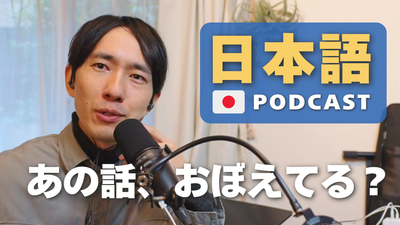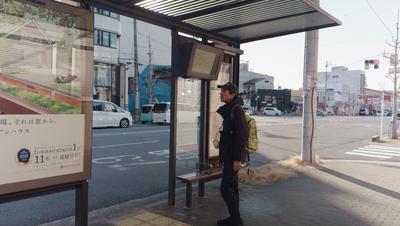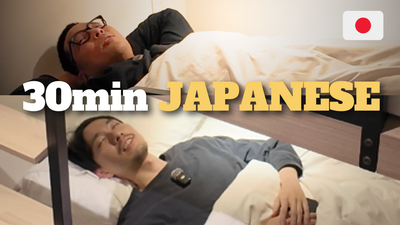Around 15:15, This episode includes mentions of eating habits that might be sensitive for some listeners. If you’d like to skip this part, please skip ahead to 21:03.
このエピソードでは、食事に関する少し繊細な話が出てきます。気になる方は、21:03までスキップしてくださいね
Vocabulary
苦手(にがて) – not good at; uncomfortable with (N3)
- 子どもの頃は苦手でも、大人になって好きになることがある。
- 人前で話すのは苦手だけど、少しずつ練習している。
- 緊張(きんちょう) – nervousness; to feel tense (N3)
- 初対面だと緊張して、何を話せばいいか分からなくなる。
- 深呼吸すると緊張が少し和らぐ。
- コミュニケーション – communication (N3)
- 言語よりもコミュニケーションの姿勢が大事な時もある。
- 相手の話をよく聞くのもコミュニケーションの一部だ。
- 集中(しゅうちゅう) – focus; concentration (N3)
- 自分に集中しすぎると、会話が難しくなる。
- 相手に集中すると、自然に質問が出てくる。
- 相手(あいて) – the other person; partner (N3)
- 相手が何を話したいのか、まずは聞いてみよう。
- 相手の気持ちを想像すると会話が続きやすい。
- 給食(きゅうしょく) – school lunch (N3)
- 日本の小中学校では給食をみんなで食べる。
- 厳しい先生のせいで給食が苦手になった。
- 厳しい(きびしい) – strict; severe (N3)
- その先生はとても厳しいルールを守らせた。
- 厳しい環境は、時にプレッシャーを生む。
- 恥(はじ) – shame; embarrassment (N2)
- みんなの前で注意されて恥をかいた。
- 恥をかかせる指導は逆効果だと思う。
- プレッシャー – pressure (N2)
- 残さず食べろという言葉がプレッシャーになった。
- 過度なプレッシャーで食べられなくなることもある。
- 自信(じしん)がつく – to gain confidence (N3)
- カフェのアルバイトで会話に自信がついた。
- バンド活動で人前でも自信がついた。
Phrases
1) 人の話を聞くのが得意になりました。
I became good at listening to people.
- 人の話を – “other people’s talk/stories”(possession + object marker)
- 聞くのが – nominalized clause “listening (to them)”+が(subject marker)
- 得意になりました – “became good/skilled at”(change + polite past)
Grammar: 動詞辞書形+の → 名詞化/〜のが得意だ「to be good at doing〜」
2) 給食は学校で食べるご飯です。
Kyūshoku is the meal you eat at school.
- 給食は – topic marker は(introduces a definition)
- 学校で – place marker で(location of the action)
- 食べるご飯 – relative clause「学校で食べる」modifies「ご飯」
- です – polite ending for a definition
Grammar: 連体修飾(a verb directly modifies a noun)
3) 今じゃ世界でも有名なジョジョですね。
Now, JoJo is famous even around the world.
- 今じゃ – casual contraction of 「今では」= “nowadays” or “at this point in time.”
- 世界でも – “even in the world” → emphasizes widespread recognition; でも adds contrast or emphasis.
- 有名な – “famous” (na-adjective modifying the noun)
- ジョジョですね – “JoJo, isn’t it?” polite ending + light confirmation tone.
Grammar:
- 「〜じゃ」=口語形 of 「では」 used in casual speech.
- 「〜でも」 adds nuance of “even ~” for emphasis (scope widening).
- 「有名な+名詞」 pattern = “famous + noun.”
Summaries in 3 different levels
N5–N4
- 子どものころ、話すのが苦手でした。
When I was a child, I wasn’t good at talking. - 学校の給食はプレッシャーでつらかったです。
School lunch was tough because of pressure. - 大人になって、相手に集中して話せるようになりました。
As an adult, I learned to focus on the other person and talk better.
N3–N2
- 自分にばかり集中していたため、会話がうまくいきませんでした。
Because I focused only on myself, conversations didn’t go well. - 厳しいルールと圧力で、給食の時間が苦手になりました。
Strict rules and pressure made school lunch difficult for me. - 視点を「自分→相手」へ切り替えると、コミュニケーションが楽になりました。
Shifting perspective from self to others made communication easier.
N2–N1
- 内向きの意識が強すぎると、対話は自己監視に偏り、言葉が出なくなる。
Excessive inward attention skews conversation toward self-monitoring and stifles speech. - 画一的なルールは学習者に不要な圧力を与え、行動を萎縮させる。
Uniform rules impose needless pressure and inhibit behavior. - 受容的に相手の関心へ寄り添うことで、コミュニケーションは自然に深まる。
Aligning with the other person’s interests deepens communication naturally.
Let's learn Japanese with stories






Member discussion